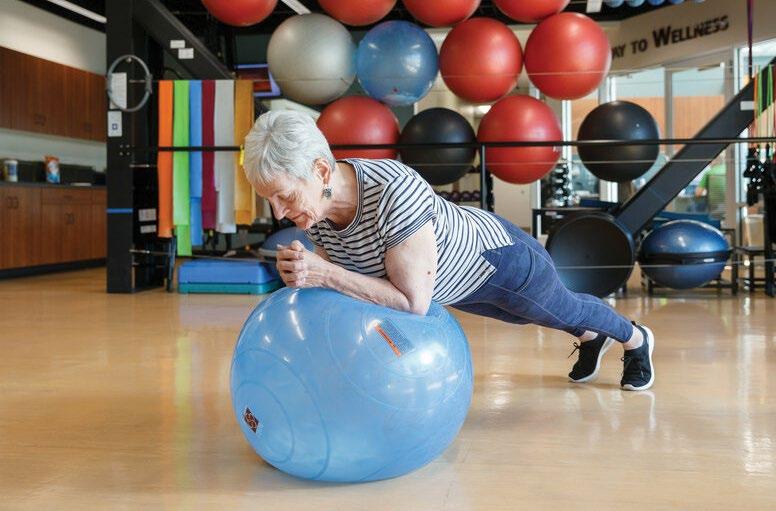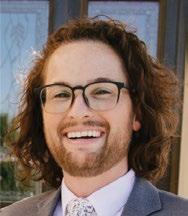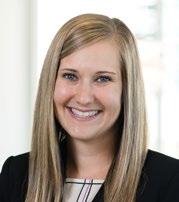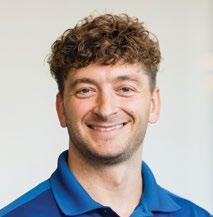
6 minute read
Health Recommendations for the New Year from the LiVe Well Center-St. George
Diet
By Jordan Bentley, MS, RDN, CD
Advertisement
I encourage you to be careful before starting a new diet in the coming year. There are many fad diets and products out there that claim to provide quick or even instantaneous results. Social media and neighbors may not be the best place to find a good diet or the best lifestyle changes. Consider asking a nutrition professional, such as a dietitian, if you have questions or would like some help with diet or lifestyle changes.
Starting a diet that entirely changes the way you eat can yield weight loss, but often, these types of diets tend to be short lived and are difficult to maintain long term.
Instead of drastically changing your diet, consider making small, simple changes. These could include avoiding or limiting sugar sweetened beverages (regular versus diet soda), increasing whole fruit and vegetable intakes at mealtimes, choosing leaner proteins over the higher fat alternatives (baked chicken breast versus fried chicken drumstick or chicken tenders), reducing distracted eating (not eating in front of the television), or eating out of the home less frequently.
Make one or two SMART goals at time. SMART goals are ones that are specific, measurable, attainable, relevant, and timely.
If you would like help with diet and lifestyle changes, feel free to reach out to Intermountain LiVe Well Center.
Preventive Medicine
By Nicole Fellows, PA-C, MS
Prevention is an important part of staying healthy and reducing the risk of certain diseases. Lifestyle Medicine is the practice of traditional evidencebased medicine with an emphasis on lifestyle and behavioral changes for prevention to help you live the healthiest life possible. With lifestyle medicine, there is a focus on key areas to improve health and provide a proactive approach towards health and overall quality of life. These areas include:
• Good nutrition
• Physical activity
• Sleep
• Stress management
• Social connection
• Avoidance of risky substances
The idea behind lifestyle medicine is prevention. Prevention can begin at any point in time in a health and wellness journey. Placing more emphasis on prevention of illness can decrease the cost of healthcare and improve overall quality of life.
Routine, annual examinations are an important part of prevention, even if you do not have any concerns. This can include physical exams, lab tests, and screenings for different illnesses, cancers, and diseases along with a review of lifestyle behaviors. These check-ups can help detect any potential problems before they become more serious. These visits can also allow for education and discussions about the benefit of vaccines, as vaccines help protect people from serious illnesses such as measles, polio, and other infectious diseases.
Exercise
By Ryan Otterson, MS, CSCS
All of us typically set behavior-change goals for the new year with our New Year’s resolutions. In many cases, these goals involve getting in better shape by starting a new fitness routine and are accompanied by purchasing either a gym pass or some gym equipment we can use in our own homes. The recommendations for weekly exercise from the American College of Sports Medicine (ACSM) are to get 150 minutes of moderate intensity aerobic exercise (think cardio) and two to three sessions of resistance training.

We all know that improving our physical fitness is important, but if you are not currently exercising, adding this amount of exercise to your weekly routine can seem quite daunting! Since building new habits can often be difficult, I have some suggestions for starting a new fitness routine in the new year that may prove helpful.
1. Start small. If getting five times per week of cardio seems like too much, consider settling for a small win and starting with two or even just one cardio session a week to get you started. Often, just starting in the first place is all that needs to take place for your actions to snowball into habits.
2. Get some skin in the game. Sign up (and pay for) fitness classes or programs that will help keep you accountable to your good intentions.
3. Enlist a friend. Getting someone else to join the journey with you can not only help to keep you more accountable to following through on your intentions to change but can make it more enjoyable, too.
At LiVe Well, we can help you implement all of these tips. We provide structured classes and fitness programs that work with your schedule and bring you together with people who have similar goals. Let’s make 2023 the year to make you the fittest you can be!

Jordan Bentley, article contributor
Jordan has been a registered dietitian for four years and has spent most of his career working with cardiovascular and diabetic patients. Since becoming a dietitian, his goal has been to help people treat their chronic diseases through diet and lifestyle change.
Jordan focuses on helping individuals who are seeking bariatric surgery and on those with cancer, diabetes, gastrointestinal illness, hypertension, kidney disease, nutritional deficiencies, and obesity. He is currently an outpatient registered dietitian for Intermountain Healthcare.

Nicole Fellows, article contributor
Nicole Fellows is a physician assistant who has been practicing medicine for the past seven years. She earned her Bachelor of Biomedical Sciences degree from St. Cloud State University and went on to earn her Masters of Physician Assistant Studies degree from Des Moines University in 2015. Before moving to St. George, Utah, she practiced primary care internal medicine at the Mayo Clinic in Rochester, Minnesota. Nicole is currently practicing lifestyle medicine for Intermountain Healthcare within the LiVe Well Center in St. George, Utah.

Ryan Otterson, article contributor
Ryan Otterson is the clinical supervisor at the LiVe Well Center at St. George Regional Hospital. He received his master’s degree in sports performance and conditioning from Southern Utah University in 2020 and earned his bachelor’s degree in exercise science from Utah Valley University in 2011. Ryan has been a certified strength and conditioning specialist (CSCS) with the National Strength and Conditioning Association (NSCA) since 2015 and is a certified weightlifting coach with Zion Barbell. Ryan specializes in strength training and improving fitness, sports performance, and quality of life through resistance training and energy systems conditioning.










